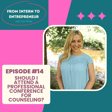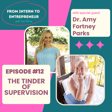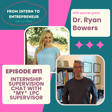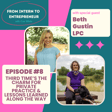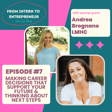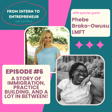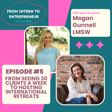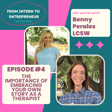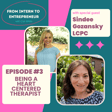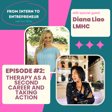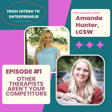Introduction and Goals of the Podcast
00:00:00
Speaker
This is from intern to entrepreneur, the podcast for counseling and therapy graduate students who want to start planning their journey to private practice while they're still in grad school. I'm your host Corey White. And within three years of graduating from my master's program, I had a six figure thriving private practice in large part because I started planning my path while I was still in grad school.
Legal and Licensing Advice
00:00:21
Speaker
This podcast is full of stories and information meant to give you ideas about how you can carve your own path to the therapy career that you want. Please note that when you're listening to this podcast, licensure laws and requirements vary from state to state. So check with your state board about what you can and can't do on your journey.
Episode Introduction and Journey Series Conclusion
00:00:39
Speaker
And without further ado, enjoy this episode of From Intern to Entrepreneur.
00:00:46
Speaker
Oh, hey there grad students. This is episode 10 of From Intern to Entrepreneur. That still feels like a really big number, 10 episodes. And this episode actually ends our journey series. So the first 10 episodes are really me interviewing therapists.
00:01:02
Speaker
about their journey from pre-grad school to where they are now successful as private practice owners in their
Transition to Topical Discussions
00:01:09
Speaker
careers. And I wanted to start with that as I launch this podcast because I really want grad students to get the inspiration of hearing what your career could be, if that's what you want it to be and like how you get there. So I hope that you've been inspired by these 10 different therapists and their stories, their journeys to private practice.
00:01:30
Speaker
But now I'm ready to wrap it up and move it on to things that are a little bit more topical. And I want to address different aspects of the graduate school experience of becoming a clinician, of becoming a private practice owner, of being an entrepreneur. I want to tackle this stuff a little bit more head on. And so next episode is going to be all about supervision. And I interview my LPC supervisor, Dr. Ryan Bowers. And when I tell you that I was nervous,
00:01:58
Speaker
I mean, imagine interviewing one of your supervisors. I mean, even though he hasn't been my supervisor for about two and a half years, it still was like, oh my God, like you're my supervisor here. But it ended up being an amazing interview. I can't wait for you guys to hear about supervision from him and the conversation we have around that. So stay tuned if you're interested in that.
Robert Huguenot's Diverse Counseling Insights
00:02:21
Speaker
In this episode, I interviewed Robert Huguenot. He is a licensed mental health counselor, a life coach and performance results development coach. He serves in the United States Army National Guard. He is a Spartan obstacle course racer, and he's known by his Instagram page where he shares information about success, mindset changes, and other therapeutic wisdoms.
00:02:42
Speaker
This was a really interesting conversation. For one, he talks a lot about his military experience and how that military experience informs his approaches to private practice, to going through his grad school program and working toward licensure and just how those values really inform his career and the way that he has organized his life. So I felt that really interesting because that was not all my experience.
Advice for Grad Students and Career Paths
00:03:06
Speaker
And also we talk about the difference between being younger in the program and being midlife or not in your 20s anyway while you're going through a grad program. So like the differences between going right from your undergraduate to your master's and then the difference between going from your undergraduate and then waiting and then going back and getting a master's in counseling. So we have kind of an interesting conversation of the impact of that.
00:03:30
Speaker
Robert has a lot of wisdom and a lot of practical, tangible advice for grad students who are trying to get on this journey. I think you're really going to learn a lot from him that I hope you're able to apply in some really practical ways. So without further ado, grad students. Great, Robert. Hi, Robert. Thank you for coming to the intern or from intern to entrepreneur podcast. I'm really happy to have you here today.
Robert's Career Path and Military Influence
00:04:01
Speaker
Thank you so much for having me, Corey. I'm really excited to be here and tell my story. Yeah, that's awesome. So let's just jump right into it. And I want you to give our graduate student listeners a little bit of a snapshot into kind of like where you are right now and what you do and how you do it and all that good stuff.
00:04:21
Speaker
So presently I run a mental health counseling practice out of New York. I'm also licensed in New Jersey and I'm able to do telehealth work in Florida. In addition, I do performance and development coaching through small businesses as well as professional athletes who are trying to look for the next, in their careers after they leave the profession, they can try to look for the next aspect of their life. As well as working with veterans when they transition from military to civilian life.
00:04:50
Speaker
So you do all kinds of stuff is what I'm hearing you say. I like to be very well versed in the field of counseling as well as coaching. It's something I'm very passionate about.
00:05:00
Speaker
Yeah, yeah. And that's really cool too, because they're very complimentary of each other. And I think that people listening to this will be like, Oh, wait, I can do both I don't have to pick and so that'll be really interesting to hear kind of like how that ended up being your path. So all right, you're doing all this really cool stuff. Take me back to how you got into the counseling field, you know, what was that journey like just that piece?
00:05:26
Speaker
So I guess we can go all the way back to my adolescent hood. I always had this keen talent to help people in every possible sense, whether that be to volunteer, whether it be to get them, or just be the person listening to whatever it is they have to say.
00:05:43
Speaker
After school, I continued this into the college level. I wanted to pursue a degree in psychology, trying to look more into this, try to really learn what maps out the human mind and what to do with their best version of themselves. I'll talk more about that in a second.
00:06:00
Speaker
After I finished my undergrad, I wanted to take this one step even further. I always had a passion for the military or a fascination nation, for the armed forces. So after I finished my undergraduate degree, I ended up joining in the United States Army National Guard.
00:06:17
Speaker
And from there, when I completed my training, I learned a lot of experiences in the military in terms of what people can do, their resiliency, their determination, all these different fields of what make them who they are. And I wanted to, again, explore this even more.
00:06:32
Speaker
When I finished my initial entry training, or our basic combat training as we call it, and our advanced individual training, I returned home and I wanted to pursue the psychology field even further.
Balancing Education, Work, and Military
00:06:43
Speaker
This is where I was going for my master's. Now like all college students or grad students for that matter, I really wasn't sure where to put my focus. I'm a soldier, fresh out of training, I'm a degree, but I'm not sure where to put it. I was thinking social work, maybe general psychology, maybe occupational therapy,
00:07:02
Speaker
But then the field of mental health, something about that really struck to me. And it got me thinking, you know what, it's getting that interest aspect and I want to look more into this. So I ended up going first in mental health counseling. And during this time in school, I wanted to
00:07:21
Speaker
continue my, since then I wanted to continue to get experience. So I found a part-time job at my local hospital working as a behavioral intervention specialist. From here I was working with adults, I was working with children, I was working with adolescents in all forms, trauma, bipolar disorder, all different types of personality disorders. And this definitely gave me good experience because I got to see it from the clinical perspective.
00:07:47
Speaker
Any grad student who is looking to get into clinical, I highly recommend inpatient in that you see all sorts of different backgrounds. You definitely get some grand experience and it gives you a way more in-depth look of how mental health is. So let's take back. I'm 22 years old at this time.
00:08:07
Speaker
At this point, I am working overtime and more. I'm a full-time grad student. I'm still part-time in the Army National Guard here. At the same time, I'm writing my thesis in trauma as well as behavioral health.
00:08:21
Speaker
And this is where I think a lot of students should take note because you will face this.
Licensure Requirements and Pandemic Impact
00:08:28
Speaker
You're going to face a lot of challenges. You're going to face a lot of adversity. And for me at the time, you think I would start my shift at the hospital around three o'clock in the afternoon. I would continue this shift until seven o'clock the next morning. Those of you who worked in healthcare before, shifts can range from eight, 12 to 16 hours.
00:08:50
Speaker
When my shifts get done, I go back, sleep for a few hours, try to stay functional in class, and I won't deny, it was not easy. But despite the hard value that it came with it, I was still able to top or finish graduate school in the top 15% of my class, graduated in the International Honor Society with Psychology, and eventually did get my degree in mental health counseling.
00:09:18
Speaker
And this definitely taught me a lot about, not just so much about hard work, but leading into the field of entrepreneurship and eventually as what I'm doing now with running a private practice. Because if I continue to, if I did not experience all that overtime and all that hardship, I would not know the value of what it is to truly run a private practice.
00:09:42
Speaker
So, when I was working on my clinical hours, I was working for the opposite persons with developmental disabilities, and those of you who do not know what is in the clinical hours aspect,
00:09:54
Speaker
During a postgraduate for New York, that is for me, our postgraduate hours until 3,000 hours, which means you had to get 3,000 hours out in the field to gain your hours for licensure. And only if you get this experience, are you able to get your license. This is New York State, that is. So during this time for me, I was working with the Office of Persons with Developmental Disabilities, Autism, Intellectual Disorder, different neurodevelopmental disorders.
00:10:22
Speaker
My specialty was crisis intervention, and similar to how I got in the clinical aspect, it was a lot of hardship and a lot of resilience. But it taught me so much about what I need to learn as far as the field goes, as far as the field goes, and as far as what I need to do to become a better counselor.
00:10:46
Speaker
So this really taught me a lot. When I finally got my license, after having exposed to the clinical world, the crisis intervention, as well as the military experience, I started to get more and started getting a better understanding of what it is I truly want to do and what I truly want to work with.
00:11:05
Speaker
So when I started consulting, and this is right around the time when the pandemic started to NFS and started to affect a lot of people, particularly us New Yorkers, we were one of the ground zero for the pandemic.
00:11:20
Speaker
I had started working with a lot of people who were out of work, who really weren't sure what to do. I was working with nurses who had faced all sorts of trauma. In addition, I was working with professionals who were out of business because they couldn't work during this pandemic. But this gave me an in-depth look at,
00:11:43
Speaker
This is definitely where I really want to put time and get people to become the best versions of themselves.
Coaching, Resilience, and Career Clarity
00:11:50
Speaker
So they have all the scope going on for them. Yet despite this efforts, there's still that missing piece. What is it? That's what I wanted to look for. That's what I wanted to find. Get people to bring them back to this sense of happiness and the sense of resilience that nothing can faze them no matter what goes on.
00:12:11
Speaker
So I started looking more into coaching performance and development and trying to, again, get people to the best possible version. And when I saw the progress of people, it gave me such hope and made me I want to pursue more of this.
00:12:26
Speaker
So once I felt I got enough experience, started my own practice, started taking them on individually. And while I was taking them on individually, started to grow and grow more. Now to this day, I do both coaching and mental health counseling. My primary specialty is Woodentail ADHD, persistent depression, as well as I call it high functioning depression.
00:12:49
Speaker
And these are definitely the fields I would recommend any grad student looks more into. These are the areas of which they are going to be. My opinion are going to be places that are the absolute focus in, especially with where our society is heading. So I would highly recommend everybody focuses in on these areas.
00:13:09
Speaker
Yeah, and it's interesting. I know nothing about military experience as I had not gone through it, but I feel kind of like your approach to going through your graduate program and getting all the hours maybe seems a little bit similar to my understanding of training for the military, where it's pretty intense.
00:13:35
Speaker
It's pretty grinding. Am I off on that or? You're absolutely hit the nail on the hammer there, Cory. So those of you who are not aware, during initial entry training, I think this is formally known as boot camp. We don't call it that anymore. But during this time, they break it down into three phases. And the first phase is really nothing but intense physical endurance. This is where you will get
00:14:00
Speaker
very little to no sleep. They're going to be constantly motivating you, or in this case, like yelling at you to just push yourself farther, faster, harder than you ever thought possible. Now, this is where most people fail out. This is where most people develop or realize it takes a lot more than the physical strength. It's a lot of the mental strength.
00:14:23
Speaker
So a little bit about myself and my own experience. So take me back to being a young soldier at Fort Jackson, South Carolina when I was doing my basic combat training. I had just gotten off the obstacle course for the third time, I believe it was. I am in excruciating pain. I can barely feel any of my muscles. I finish, I collapse on the ground, and then I remember one of the drill instructors.
00:14:52
Speaker
comes up to me and starts waving a bottle of water in my face while I'm collapsed in pain telling me you want it. You want the water? Quit and I'll give you some water. In that moment the thought had crossed my mind. All I have to do is just take that water and it's over. This pain is over and I can do it and it just stops.
00:15:16
Speaker
that little, somehow a little bit of courage in that cup, I just got into what we call a front leading rest position, which is also known as a starting pushup position, and just stood there. In that moment, I knew I've come too far. I need to keep pushing myself. And this definitely triggered something in me because all the resilience and all the hardships we had eventually faced after,
00:15:44
Speaker
I knew I just had to keep going. I just knew I had to keep pushing myself. And it was these challenges and this adversity that eventually me throughout my military career and eventually when I did get to school and I was working so significantly and when I started my practice and that same adversity I experienced all those years ago is definitely a bearing to who I am today.
00:16:13
Speaker
Yeah. And I think that one of the things that I've really been trying to highlight for grad student listeners on this podcast is that everybody who gets into the field has a different past story and has different strengths that they've picked up along the way that prepare them for a graduate program, that prepare them to be counselors, that prepare them to be entrepreneurs if that's what they choose. And so I really hear how your experience and your training in the military
00:16:43
Speaker
set you up to have a mindset that helped you throughout your program, where maybe someone without that same training wouldn't be able to use a mindset like that because they weren't trained for it, but it was a strength for you. And so I really like for people to be able to hear that we all have different strengths. And if you can leverage yours the way that it sounds like you did, then it's just a way to really propel you
00:17:12
Speaker
and get you through
Community Building and Experience Sharing
00:17:13
Speaker
grad school is really difficult like it really is difficult there's like not enough hours in the day there are more assignments than you can count there's no communication between your site and your
00:17:28
Speaker
professors around, hey, do we have big things coming up? Is this your heaviest clinical week and also your finals? They're not communicating like that. So it's kind of cool to hear that you had this past training that helped you get through some of the wildness of getting through grad school.
00:17:51
Speaker
Hey grad students, real quick before we get back to this interview, if you are loving the idea of being a part of a community of like-minded graduate students who want to own their own private practice one day, then you need to head to Facebook and join my Facebook group from intern to entrepreneur. There's already a community set up of graduate students who one day want to own their own private practices, and we entrepreneurs just like you.
00:18:17
Speaker
So head over to Facebook, join that group, and stay in the loop and get connected with people who are doing things that you want to do. Back to the interview. Help me understand for you, what was it like deciding that you were going to go into private practice? How did you make that decision?
00:18:38
Speaker
So I'm glad you asked. So it took a while for me. When I initially started, when I actually finished in the military and I was applying for grad school, during my undergrad, all my professors had told me, what is your plan for grad school? And I told them, I don't have a plan for grad school. So when I was looking for programs, again, I was looking into general psychology. I was looking into
00:19:03
Speaker
occupational therapy, I really was not sure what to look for. So when I went mental health counseling, it opens up my opinion, Pandora's box two opportunities. So even if I wasn't going to go into mental health counseling, at least give me some idea of what it is I can look more into. During grad school and during my preclinical hours, I was focusing on personality disorders as well as behavioral trauma.
00:19:28
Speaker
After a school I was looking into for hours, I looked into opposite persons with developmental disabilities. Again, I was looking more into neural developmental disorders. During this time, I'm also in crisis intervention with different mental health disorders. And as I mentioned before, in grad school, I was working in inpatient school, so I had all sorts of experience. So giving this wide variety of what I had focused on in mental health,
00:19:57
Speaker
It's helped me really narrow down of what it is I wanted to pursue. And one of the advantages I got in private practice was that I can choose who it is I do and I do want to work with. Because for me personally, it doesn't just come down to the treatment aspect or the field of expertise.
00:20:20
Speaker
It's that mutual connection, that mutual connection that we as therapists build with our clients. And I think I could speak for almost every therapist when I say the therapeutic rapport is the essence of every clinical relationship.
00:20:35
Speaker
So the opportunity in private practice, I think is the best opportunity to do that. So that's what ultimately influenced me to get into private practice, to find that connection, build that therapeutic aspect and get them, as I mentioned before, to the best possible version of themself. And I know I didn't get that during my preclinical hours. I know I didn't get that during my clinical hours inpatient and so on.
Career Path Decisions and Private Practice Benefits
00:21:05
Speaker
I have found it in private practice and I think that's absolutely essential. But before we ever get into private practice, I do highly recommend grad students expose themselves to as much as they can to really find out what it is that they're truly passionate about. You will not find it on your first try. I know I didn't. It took me several tries to find what it is I really was passionate about.
00:21:30
Speaker
And when you do find that passion and when you do find at least the group that you feel that you can work best with and bring out those strengths that you have, then I would say look into private practice. Is that at least at that point you do have the experience and you know exactly what it is you're looking for? Yeah. Okay. So I think that you said you went or you graduated or you went to your master's program at 22. Is that right?
00:21:56
Speaker
So I had finished my initial entry training or my combat training when I was about 23 years old, yes. And I started grad school around that summer following year. So 22, 23 years old is when I started my grad school. So I love having these conversations because I wonder, there's something, I always learned something different or always like pick up on different things. And in talking to you,
00:22:22
Speaker
I guess what I'm wondering if maybe there's a difference between being younger and getting into the field and being older or second career and getting into the field because I work with a lot of interns and
00:22:37
Speaker
And each time we take interns at my practice, we have a mix of people who go right from their bachelors to their masters. But then we also have people that this is a second career. And what I'm noticing, and it's being highlighted from hearing your story, is that people, when it's their second career, often have more clarity on who they want to work with.
00:23:01
Speaker
versus when it's a first career in a lot of ways or maybe when there's not as much, I don't want to say life experience because you obviously have a lot of life experience, but you go more from a one school to one school that maybe it's a little bit more like, I need to get some different experiences here.
00:23:23
Speaker
to be able to figure out how I know what I like and know what I don't like. Because I actually fall, well, and this, this conversation has changed my mind a bit. I fall a little bit into the other camp of like, no, know what you want to do and then go find an internship there, right? So I knew, I went to my master's program in my thirties and I knew I wanted to work with couples. And so I went and I found a private practice where I could work with couples.
00:23:50
Speaker
And then when I graduated, I started my private practice and I work with couples.
00:23:55
Speaker
And so sometimes I think I work with the newer, uh, the, the people in their twenties that are starting their career. And I'm like, well, what do you want to do? Well, what do you want to do? And, and I'm talking to you and I'm going, no, there might be something too, depending on where you are needing to expose yourself to different things to be able to practice. I hate this. I love this. That's fine. I could do it, but I don't want to. So I don't know if that's resonating with you at all when I'm, when I'm saying this.
00:24:26
Speaker
I absolutely understand, Cory. And when I was in school, I did see a lot of people who had chosen the mental health field as their second career options. But they had, with all that years of experience in their first career, so I actually, there's one person who I did go to school with.
Career Transitions and Personal Fulfillment
00:24:45
Speaker
They were, I think, a photographer for almost 25 years of their life.
00:24:49
Speaker
And they had a lot of social connections, and they had a lot of interactions. So they had come to this conclusion, if I recall correctly, they had always been good with people. So why not focus into a field that involves more people? So that led them into counseling. Not so much as mental health, but just that field of counseling in general. Even if they can pursue anything, it's just something else for them to look into.
00:25:17
Speaker
I think the difference is mainly is when you do go into your second career when you are older, you have a lot more experience elsewhere. You have that wisdom, which I think, in my opinion, the younger group can definitely benefit from because the younger group is a saying. They have youth and the older group has experience. Bring them together.
00:25:40
Speaker
Yeah, what a cool perspective and yeah, I guess thank you for kind of being so
00:25:50
Speaker
direct and how you view it, because in hearing the way you're talking about it, it's allowed me to shift my perspective a little bit. And also in recognizing, I mean, this isn't really new information, like everybody is different. And so yeah, my perspective works for a group of people. And your perspective is a good perspective for a different group of people. So
00:26:12
Speaker
Yeah, what a cool what a cool way to kind of like highlight that and and I hope that maybe that grad students listening to this can kind of reflect on The differences and and here are two different perspectives and reflect on maybe where they are in that. Yeah, that's real cool I want to ask a couple other questions about
00:26:33
Speaker
what your life is like having a private practice and what you see as the benefits versus maybe what are some drawbacks if you see any. Yeah, so what would you say about that? So as far as benefits go, in my previous work experience, start with the military.
00:26:54
Speaker
The military was a great part of my life, absolutely amazing. One thing the military always embraces though is that the mission always comes first, which I wholeheartedly understand being a soldier. But therefore, your personal endeavors, they always get them in order because you will have to focus on the mission.
00:27:15
Speaker
And that's my military perspective. In my previous years and the previous jobs that I've had. So I'll start with my public crisis intervention. I remember answering phone calls at three o'clock in the morning and to handle the crisis situation. I remember having to go in on holidays to handle the situation. I do often remember getting to
00:27:40
Speaker
It calls for my boss and my colleagues saying, like, we have a situation, we need you in. I'm living in Westchester County at this time. And they had situations going on in massive people of Long Island. And those of you who are not from New York, this is about two and a half hour drive from the north part of New York through the city all the way out to Long Island.
00:28:01
Speaker
And during this time, it was very, very demanding for me. And I'm young and ambitious at this time, but I knew I can't do this forever. I can't be answering phone calls, or 3 a.m. phone calls, I can't be doing crisis prevention most of the time. At some point, I need to take a step back. So the advantage is I've learned in private practice, or the biggest advantage I've learned in private practice is freedom.
00:28:28
Speaker
And by the freedom aspect is I pick and choose a plan so I know I can help, that I want to help. In addition, I'm very flexible with my time. I can make the time for my clients, I can make time for business, I can make time for myself, I can make time for my family, and I'm really passionate about that, the freedom aspect, where I can adhere to the demands of what my clients need, what I need, and what my family and friends need.
00:28:56
Speaker
So, freedom I would say is the biggest advantage of a private practice. Yeah, I think that's really interesting the way that you said that in terms of you've recognized at different points in your life that you weren't always able to prioritize yourself. And like in your military career, that's understandable.
00:29:19
Speaker
There's a job that's happening. It's a certain kind of work. And maybe there's a little room for improvement there on how they could prioritize that. But overall, you're there for a reason, and that is the priority. And then you're talking about your crisis intervention work, where I think that that is
00:29:38
Speaker
That is the mental health that is ingrained in us in grad school like you are gonna have to sacrifice yourself in order to help your clients when they're in crisis or help people that are in crisis and so we really. It's easy for us to get this mindset of like oh we don't our life is secondary to what the job needs and what our clients need and yeah what you're learning through private practices oh wait a minute.
00:30:04
Speaker
I get to decide when I'm available. I get to decide what boundaries I have. I get to decide how I work best. And then how does that impact your mental health? So me, depending where I want to work, again, where I shift my focus and where I want things, I think it puts me in a better state, again, knowing that
00:30:26
Speaker
So as I said before, I needed to really expose myself to find what I want. Once I found what I wanted personally, it definitely made me feel better about the career that I've chosen, the field I want to get into. And this ties into the coaching aspect too, because I do get so much enjoyment out of coaching that when I get the call at 3am, my mindset is no longer like, God, this is like serious, I definitely need to answer this call. And now it's like, okay,
00:30:55
Speaker
I get to handle, I get to help somebody and take care of what they need to take care of. My whole perception has completely changed of how I approach things as opposed to doing the sake of doing the work and looking forward to doing the work. That's the main difference.
00:31:12
Speaker
Yeah. Yeah. And it seems like there's a lot less stress and urgency that might be present in your life because you're able to take a beat and do things the way that you decide that you want to do them. I couldn't have said it better, Cordy. Yeah. Any drawbacks that you see to sort of being in private practice at this point for you?
Business Knowledge and Entrepreneurial Challenges
00:31:35
Speaker
So the biggest drawbacks for me was getting started. Now this is something I really, I hope they are teaching more about in grad school. But when I first started, I didn't know anything about business. And I mean nothing. I studied psychology for four years, I went into the military, then I studied more psychology. The only business I knew about was watching Wall Street as a kid. And that is it.
00:32:00
Speaker
So the drawbacks that I saw was lack of knowledge. So I really had to teach myself. I had talked to people who I know had been running businesses. I had read books. I had gone online. In my downtime, I was really trying to learn the whole business aspect. And I thought I could grow it. But like every first-time business owner, it's not going to go the best. It's going to go south.
00:32:29
Speaker
And I see this as an advantage though, because now you learn all the things of what you can do to improve and you keep re-improvising this. And it's drawbacks time where again, finding the right clientele, getting clientele, marketing myself, there is so many drawbacks here. But again, you have to constantly put in the work and the determination. We'll talk more about that in a second in order to get to where you want to be in your practice.
00:33:00
Speaker
Yeah, essentially, essentially what you're saying is that one of the drawbacks is you have to learn a whole nother career, right? Business is a whole career. It's a whole master's program. It's it's a whole thing that people study to learn how to do. So yeah, if you decide that you're going to go into private practice, if you want to do it well, you're piecemealing and putting together a whole nother
00:33:26
Speaker
career, right? So yeah, absolutely. And I don't know about you. I find that that helps me break up the clinical work. I find that that helps me use different parts of my brain.
00:33:42
Speaker
that allow me to rest the parts of my brain I need to use clinically. And it kind of gives me a little bit of a break. So even though at times it's really stressful, like, oh my God, my current stressor right now is learning. So I have Google ads is one of the ways in which my practice draws clients in and Google ads
00:34:00
Speaker
and Google Analytics is recently, they're changing their interface and so I'm having to migrate all the data. I can't even talk about it because I don't even understand it because I'm trying to, I almost threw my computer at the wall the other morning because I was so confused and
00:34:16
Speaker
just inundated with like, what the f am I doing right now. And so there are those moments that are really difficult. And then there's other moments where I go, Oh my god, it's like so fun to put together this therapy group, book club marketing material, because like, that's cool. And that gives me life and gives me a break. So so yeah, I don't know if you've had any, I don't know if you've had any mixed experiences in that way.
00:34:43
Speaker
Oh, absolutely. When I, again, started learning more about the business world, again, I didn't know much about business. I didn't know much about marketing. I didn't know much about, you had mentioned Google Ads, even the technology aspect. So online therapy wasn't as big at this time. And the technological aspect, I was no tech savvy.
00:35:04
Speaker
And so utilizing different specs to try to get my practice underway did not work out for me. For me, it was so much to learn at once. I'm thinking, okay, you know what? I won't worry about the tech stuff. Let me just focus on the business stuff, but then I can't focus on the business stuff. I need to focus on the marketing. If I need to focus on the marketing, I need to focus on the practice. So I'm just like jumping around all these different directions and I have almost so much going around me. It's just like,
00:35:34
Speaker
This is just, I did take a step back though and realize, okay, pick one, just pick one and the rest will follow. And then it's something that I did learn does happen over time. So small portion of that I would say is trust the process. Stay focused and trust the process.
00:35:58
Speaker
Yeah. And that is similar to something I think what you were just describing there, it made me think of what you were talking about earlier. So earlier you had said that you recommend that people get all kinds of different clinical expertise and different settings and different areas. And I think what you were just talking about is also similar to that where when you learn how to be an entrepreneur, you are learning about all of marketing, networking,
00:36:23
Speaker
technology taxes all of these different things where you're getting a little bits of exposure to and along the way you find out what you actually like and What what you are good at and then you can hone that and then maybe you know, so I am terrible at Taxes and and and bookkeeping and stuff like that, right? So so that's not my job right now, right? That's somebody else's job. I
00:36:47
Speaker
And I'm really good at marketing, and so I do marketing, right? So in that same way is that you have to try everything to realize where your strengths are as a business owner and where you need to ask for help or pay for help.
00:36:59
Speaker
You're absolutely right. Resourcefulness, that's a key factor in business. Not just so much, because nowadays there are an infinite number of resources out there, especially if we have access to the internet. And the resources that exist now, especially for grad students,
00:37:18
Speaker
When we were writing our papers and we were writing our thesis, the amount of resources that we had access to was virtually infinite. It wasn't so much about the resources though. It was about resourcefulness and what exactly it was we were looking for. And I think this is opportunity for students, especially if they do want to go into a private practice, knowing how to obtain the right resources for them. Yeah, absolutely. Yeah, great points. So I want to ask you,
00:37:48
Speaker
the final two questions, which are my two favorite questions. And the first one is, what practical advice would you offer to a grad student who was interested in an entrepreneurial journey?
Resourcefulness and Determination in Entrepreneurship
00:38:03
Speaker
That's an amazing question. One practical piece of advice for a student on an entrepreneurial journey. I would say set a plan.
00:38:17
Speaker
but be ready to improvise or and be ready to improvise. And why I say this is because one of the things I've learned in business is the number one skill you need to have in business is being able to improvise because there is always going to be a setback. There's always going to be something that changes. There's always going to be competition, a global pandemic, artificial intelligence is blowing up right now.
00:38:46
Speaker
It's not so much as how you continue to run this, but how you improvise in the changing environment. So you could set a plan for a year, three years, five years, 10 years, but always be ready to maneuver through the obstacles that you will come across your way. A little bit about my own experience. When I first started consulting, I was taking everybody I could take on just to build the practice.
00:39:16
Speaker
didn't really work out for me. I was getting clientele, sure, but not the clientele I wanted. So I also needed to be able to market myself. Not really the marketing I wanted, but I needed to improvise. And addition came with the branding, coaching, lack of education, certain areas that I wanted to focus in. So my plan to create the practice and get the experience, it was all still there. But I had to maneuver around with different parts to get to
00:39:43
Speaker
me eventually get to the destination of where I want them to be. So the practical advice I would leave for grad students, set a plan. Well, on that subject, set a plan, get a pen and paper. One of the things they taught us in the military is always have a pen and paper on hand at all times. And I always personally, I take my goals, what I want to set. I make sure I accomplish them at least one of them every single day.
00:40:14
Speaker
And I want to make sure that I stay, stick to that plan. There's always going to be setbacks. There's always going to be obstacles. So I have to maneuver through them single day, but no matter what, I stay focused and continue on the plan. That I say is the best. No, no, no, go ahead. I just think that's great advice, but keep going. I was just going to say that I would say is the one piece of practical advice for any grad student who's on their entrepreneurial journey.
00:40:44
Speaker
Yeah, I just, I really agree with that. And that's part of the reason I wanted to create this podcast is so that people start thinking about their plan now and not waiting until they're so burnt out at whatever job they're at to go, you know what, maybe I want to do that private practice thing now.
00:41:03
Speaker
I think that even if your plan is long, even if your plan is, you know what? I want to do my internship in an inpatient place. And then I want to get my licensure hours at this type of facility. And then I want to go spend a year at a private practice. And then I want to start my private practice. Even if your plan is a five-year plan to get there,
00:41:24
Speaker
You should be thinking about it now and you should be making decisions that are in alignment with where you are. And then once you get closer to that, you should be adding on yours to your plan. Once you start your private practice, you should be thinking, where do I want to see it in five years? So I love that because I'm so geared toward, yes, like, so what is your next step? What is the step after that? And also, it's really important that you're acknowledging and you have to be ready to pivot. You have to be flexible.
00:41:51
Speaker
So that if one thing doesn't happen or if you, you know, I mean, I imagine that I knew I wanted a private practice. I knew I wanted to work with couples, but if I had taken my internship, started working with couples and realized I hated it, well, I was going to have to pivot. I was going to have to find a different population to work with, or I was going to have to create another plan for that. My end goal would still have been private practice, but I would have had to, you know, change the path a little bit.
00:42:12
Speaker
I think that's really, really helpful advice. And absolutely, everybody listening to this right now should get out a pen and paper and they should write down where they want to do their internship, where they want to get their first experience post-grad, when they want to start a private practice, what population they want to work with, all that stuff. So moving right along though, next question, what is one piece of mindset advice that you would offer to graduate students interested in an entrepreneurial journey?
00:42:42
Speaker
The one piece of mindset for grad students in the entrepreneurial journey, I would say persistence or determination for that matter. And the reason being is when I was in grad school, again, I really wasn't sure where I was focused, but my goal was to at least finish and maybe find something. And even during the time, I really wasn't sure where to put my focus.
00:43:11
Speaker
Fortunately, I had a lot of support from grad students and listen carefully to all the grad students, because those people that you are in those classes with, make friends with them, get close to them, because they will remain your besties for long after you graduate, at least from my experience. So we called me and my group, we called it trauma bonding. I remember when we were in our last few months, we were all struggling, we were all
00:43:40
Speaker
uh, exhausted or now. But despite the exhaustion, we were all remained very close because we were all so determined. It's like, if anyone needs help picking each other up, I got you. Cause we were all determined. We're going to graduate together. We are all going to us. Oh, high military experience as well. That sounds like, that sounds also like you bringing your military experience into your experience in your professional world.
00:44:09
Speaker
There were definitely military experiences that helped. I mean, team building was a big one in the military and the friendships I did make in the military influenced a lot of the friendships I did make in grad school. And that's why I say the determination aspect is a huge factor because
00:44:27
Speaker
There will be, you will support your friends and they will support you or your fellow students. And it's this determination that I think will not only get you through your studies, but eventually onto the next path. Because if you do continue to choose to go in the field of psychology,
00:44:44
Speaker
there will be more education, there will be more experience that you will have to gain. And it comes down to the determination and the commitment to getting to where you need to be. Again, going back to my own experience, it took me, let me think.
00:45:02
Speaker
It took me four tries to pass the National Clinical Mental Health Counselor's exam. On top of that, it took me almost seven or eight months to find a job that was willing to take me for my clinical hours as a permanent holder. And on top of that, it took nearly two years to get my licensure itself or the amount of hours I required for licensure.
00:45:28
Speaker
So it's that determination though, that make me allow them getting that mindset to, I'm going to get this. I want this.
00:45:38
Speaker
And it will start with grad school. Grad school, you will see a lot of the hardships. You will see a lot of the focus, but it's the same place that will develop that mindset of determination. Give the support that you have from all your fellow students. And it's that same determination mindset that will develop long after you graduate. Yeah, that's awesome. And that's such good.
00:46:02
Speaker
perspective and insight that anybody listening to this, whether you're in graduate school or not, or at any point in your life, that is definitely useful.
Conclusion and Future Interactions
00:46:13
Speaker
So Robert, tell my people here how they can contact you or follow you if they have any questions for you or would like to stay in touch.
00:46:25
Speaker
So I do most of my marketing via social media, aka Instagram. My user profile is robby underscore huge.
00:46:37
Speaker
that's probably underscore huge. You can follow me on Instagram. There will be a link in my bio that can take you directly to my private practice page. If anybody is looking for counseling and or performance and development coaching, you can click the link and we can start working together. If you have any businesses that are looking to grow or expand, you can click on the same link. Again, that's R-O-B-B-Y underscore H-U-G-E.
00:47:06
Speaker
Find the link in my bio and let's get started working together. Yeah, perfect. And I will also share that in the show notes so that people will be able to just click and then find that and they'll be able to connect with you very easily. So Robert, thank you so much for joining me today. I think that people are really going to be interested in hearing your story and ways in which a concept that you've talked about today will be helpful for them on their journey. So I appreciate it and thanks again.
00:47:36
Speaker
Corey, thank you so much for having me. This was such a great experience and I do look forward to I hope our paths cross again in the near future.
00:47:45
Speaker
I hope that you loved this episode of From Intern to Entrepreneur, and if you want to learn more about what we talked about, check out the show notes. If you love this podcast and you want to support me in continuing to create content for entrepreneurs, then please share this with a friend, a grad student who you think might want their own private practice one day, and also like, subscribe, and review this podcast wherever you're listening to it.


